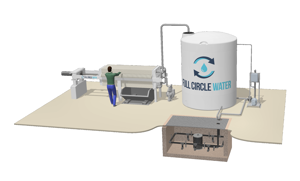|
GRANITE
& STONE INDUSTRY
SOLUTIONS
FOR SLURRY WATER
Recycling
water in stone and granite shops is our wheelhouse - it's
how Full Circle Water got started in the business many years
ago and they just keep getting better. With
hundreds of systems still running virtually trouble free
after years of service, we’re confident that they can find
a solution for your stone and granite fabricating business.
In addition to gaining a competitive edge by positioning
yourself as an environmentally friendly company, recycling
your water can save you hefty fines for non-compliance of
city, state, and federal regulations. There is also a
tremendous cost savings on your decreased use in municipal
water. If
you have an existing operation, or are just setting yourself
up we can help make the transition go as smoothly and
efficiently as possible. No matter where you are in
your process though, we want to help because we do this
every day and there will likely be some questions we will
ask or suggestions we may have that you might not have
considered. Part
of the cost effective solution lies in the planning phase by
making sure we have a complete understanding of your needs.
The
settling of stone, granite, glass and water requires space
and time. Each particle has a rate of settling – the
farther the particle needs to settle the longer it takes to
settle. The
efficiency and speed of settling can be increased by
injecting polymers (products/chemical treatment) into the
waste stream which increases the size of the particles by
attracting and bonding the individual particles together. Settling
efficiency can also be increased by adjusting fluid dynamics
of the water and by increasing settling surface area and
settling time. Settling Ponds, Silos (Products/RS
Tower), lamella clarifier, inclined plate clarifier and
Rapid Settlement Systems (products/RSS) all enhance
settling. Filtration
systems require a physical barrier that will not allow
particles of a certain size to pass through. Particle
size is measured in microns. The human eye can see
down to approximately 50 micron. Suspended solids in
water typically are measured down to .1 micron and up to
about 150 microns. Various
types of filter media are used including cloth, a bed of
sand, modules, etc. The
most common industrial wastewater filtration systems are
typically plate and frame press (filter presses) or rotary
vacuum drum equipment. Pressure drops from 1 side of
the barrier to the next indicate when the filter load has
been maxed and cleaning or replacing needs to take place.
|

